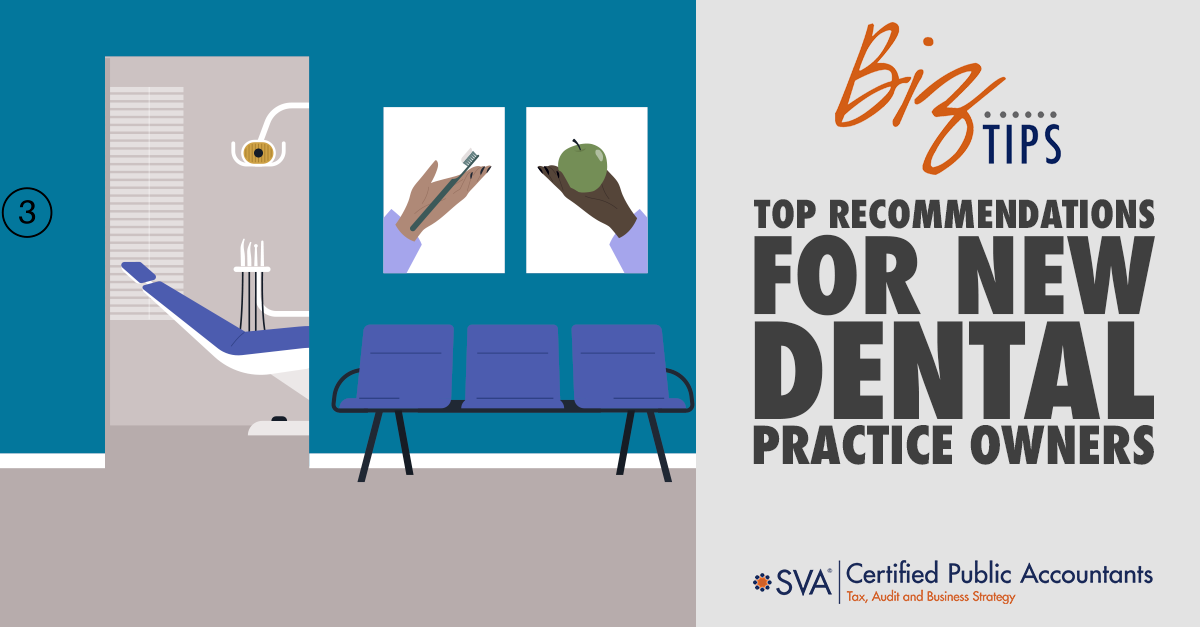| Highlights: |
- Offers eight strategic recommendations for new dental practice owners to build a strong foundation in financial, operational, and clinical areas.
- Covers essential steps such as defining goals, establishing clear policies, investing in staff training, and implementing robust accounting systems.
- Encourages proactive planning around budgeting, marketing, compliance, and patient experience to support efficient growth and long-term success.
|
Is owning a dental practice in your future? You’re passionate about your career, and now you are ready to create a thriving and successful practice. Choosing the right entity to create a sound financial framework and minimize taxes is the first step.
Top Recommendations for New Dental Practice Owners
Here are the top things you need to know to get started on the right path.
1. Entity Structure
As you start your dental practice, it’s important to select the correct entity designation. One way to structure your practice is through an LLC (Limited Liability Company). An LLC’s main goal is to shelter the owner from liability. From there, you can make tax selections to determine the actual status of the entity.
Here are the ways in which you can structure your LLC:
Single Owner (Single Member LLC)
| Sole Proprietor |
This is where the practice is not a separate tax entity. Reporting the practice’s income and expenses is done on your individual tax return, not on a separate tax return for the practice only. |
| S Corporation |
This is a tax election that an LLC could make in which there is a separate corporation for the practice. In essence, it functions as a separate person in the eyes of the IRS. An S corporation is a flow-through entity where the practice’s income and expenses are reported to the owner on a K-1. |
Multiple Owners
| S Corporation |
A multiple-owner S corporation is treated the same as a single-owner S corporation, as noted above. |
| Partnership |
A partnership is not a separate taxable entity under federal law. Income from the partnership is taxed to the individual partners on their individual tax returns. |
(Download Video Transcript)
2. Accounting Systems and Internal Controls
Every new dental practice owner needs to consider their accounting system. It’s essential to have it set up well because that accounting system will let you monitor, from a financial standpoint, how the practice is doing, if you bring in more money than you pay out in expenses, and ultimately, it will help with your tax planning and filing.
Make sure you review the results and statements that are generated by your accounting system regularly. Look at them in conjunction with reports pulled from your dental practice management software. Monitor what's going on in your practice, watch for trends and changes, and make sure your practice is operating the way you think it should.
Determining internal control procedures and policies to implement is crucial in any business. Here are some recommendations that you should be sure to adopt:
| Separate Duties |
For example, when handling patient payments, one person should receive those payments (whether it's directly from the patient or through the mail), a different person should post the payments in your practice software, and then even someone else should be responsible for the bank deposit. This procedure will ensure the payments are posted correctly, recorded correctly, and nothing is happening to them as they’re moving through the process. |
| No Signature Stamp |
Never use a signature stamp to sign checks. Don't make it easy for someone to put your signature on a check. As time-consuming as it might be, sign all your own checks. |
| Background Checks for Employees |
Consider background checks for your employees to make sure you're hiring quality staff members. |
| Watch for Changes in Employees |
One of the first big signs that something might be wrong in your practice is if one of your employees suddenly has big spending habit changes that can't be explained. Watch for any changes in your employees’ spending habits to protect your practice. |
3. Qualified Business Income Deduction (QBI)
Also known as the Section 199A deduction, QBI is a tax deduction that allows eligible self-employed and small business owners to deduct up to 20% of their qualified business income. Qualified flow-through income can come from entities such as an S corporation, partnership, or sole proprietorship, as well as rental property.
There are some limitations to QBI:
- Deduction limited to 50% of wages, or 25% of wages plus 2.5% fixed asset base.
- Deduction phases out for service businesses – Service businesses, as defined by the IRS, include those in the field of health, including dental practices. This means while other businesses, such as a manufacturer, more easily qualify for this 20% deduction, those in healthcare have phase outs of this deduction based on income.
Many new dental practice owners, especially in the first year, could initially be eligible for the 20% deduction. It depends on the profitability of the practice and your overall tax situation.
4. Practice Staffing
What should the makeup of your practice staffing look like? Here are some recommended configurations based on the number of owners and the amount of collections:
Example #1:
Typical 1 dentist practice with $1 million of collections:
- 2 Hygienists
- 2 Assistants
- 2 Front Desk
- 1 Dentist
- 7 Total Employees
Example #2:
Typical 3 dentists practice with $3 million of collections:
- 6 Hygienists
- 6 Assistants
- 6 Front Desk (Employees assigned specific duties)
- 3 Dentists
- 21 Total Employees
5. Key Practice Ratios
There are many important ratios and metrics, other than what is on your financial statements, that you will want to measure to help improve the profitability and overall growth in your dental practice. Examples include:
- Production (per hour or per day)
- Collection Percentage
- Overhead Expense Ratio
- Hygiene Production Ratio
- Doctor Production Ratio
- New Patients
- New Starts
The specific ratios will vary by practice and specialty. Find the ratios and benchmarks that are important to you and your practice. Track those over time, monitor them to see how and why they're changing, and determine what you can do to help make them change in the right direction for your practice.
6. Dental Membership Plans
Dental membership plans provide an alternative to dental insurance and address the primary barrier to increasing new patient flow and practice growth. With these plans, the patient pays a specific amount to receive a specific benefit with no risk to either the patient or the practice.
Dental membership plans are office-specific and the set membership fee covers dental exams, cleanings, and x-rays. You can then decide if you want to offer discounts on other services (typical discounts range from 5% to 20%) and different rates for children and specialty patients.
Why should you offer a dental membership plan? Practice benefits include patient loyalty, patients have no excuse not to come in for their cleanings, easy access for the patient, and high acceptance rates. Patient benefits include affordability, budget friendly, and clarity (the patient knows what’s included and what is not).
(Download Video Transcript)
7. Retirement Plan
Even though there are a variety of different retirement plan options available, the most important thing for a new dentist is to pick one and get started now. As a young dentist and a new practice owner, time is on your side so start making those contributions to a retirement plan.
The advantages of a retirement plan for your practice include:
| Putting Yourself in a Position to Retire on Your Timeline |
The sooner you start putting money away, the sooner it starts to compound and grow, and the sooner you can meet your retirement goals. |
| Saving Taxes |
If you contribute a large sum to your retirement plan each year, you also can potentially save 40% in tax on that contribution. Instead of paying it to the IRS or the Department of Revenue, you can pass some of that savings on to your staff, which is especially important in this tight labor market. |
8. Deductible Expenses
Now that you’re a new practice owner, do you know what expenses you can deduct? Some typical deductible business expenses that relate to the practice or performance of dentistry include:
- Continuing education and related travel costs
- Travel to meet with advisors
- Cell phone (if used for the practice)
- Home computer (if used for the practice)
- Dues, licenses, memberships
SVA Certified Public Accountants’ team members have in-depth knowledge of the dental industry that only comes with years of experience working with practices like yours. We can help with every life stage of your practice – from start-up, through the growth phase, and eventually when you transition out of the practice. Contact us today. We are here to help.
© 2022 SVA Certified Public Accountants

